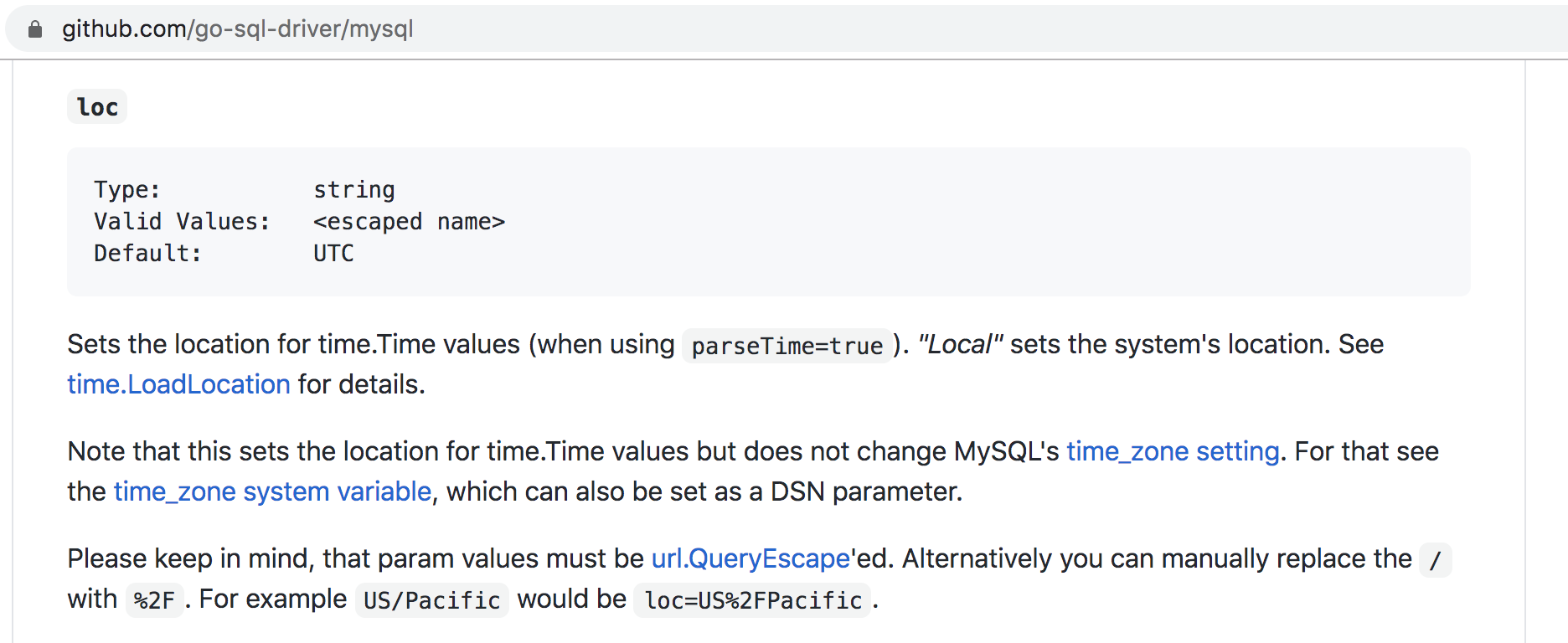Introduction
Since this issue is frequently asked, we have created a separate chapter to detail how timezone handling works in ORM. Here, we use the MySQL database as an example to explain the timezone conversion, with our local timezone set to +8 and the database timezone also +8.
The most commonly used MySQL database driver is this third-party package: https://github.com/go-sql-driver/mysql, which contains a parameter:

In essence, this parameter is used to convert the timezone for the time.Time when you submit it as a time parameter. When connecting to the database with the loc=Local parameter, the driver will automatically convert your submitted time.Time parameters to the local timezone set by the program; if not manually set, it defaults to the UTC timezone. Let's look at two examples.
Conversion Examples
Example 1, Setting loc=Local
Configuration File
database:
link: "mysql:root:12345678@tcp(127.0.0.1:3306)/test?loc=Local"
Code Example
t1, _ := time.Parse("2006-01-02 15:04:05", "2020-10-27 10:00:00")
t2, _ := time.Parse("2006-01-02 15:04:05", "2020-10-27 11:00:00")
db.Model("user").Ctx(ctx).Where("create_time>? and create_time<?", t1, t2).One()
// SELECT * FROM `user` WHERE create_time>'2020-10-27 18:00:00' AND create_time<'2020-10-27 19:00:00'
Here, since the time.Time object created by time.Parse is in the UTC timezone, it will be modified to the +8 timezone by the underlying driver when submitted to the database.
t1, _ := time.ParseInLocation("2006-01-02 15:04:05", "2020-10-27 10:00:00", time.Local)
t2, _ := time.ParseInLocation("2006-01-02 15:04:05", "2020-10-27 11:00:00", time.Local)
db.Model("user").Ctx(ctx).Where("create_time>? and create_time<?", t1, t2).One()
// SELECT * FROM `user` WHERE create_time>'2020-10-27 10:00:00' AND create_time<'2020-10-27 11:00:00'
Here, since the time.Time object created by time.ParseInLocation is in the +8 timezone, which is consistent with the loc=Local timezone, it will not be modified by the underlying driver when submitted to the database.
Note that when inserting data that includes time.Time parameters, attention should also be paid to timezone conversion.
Example 2, Not Setting the loc Parameter
Configuration File
database:
link: "mysql:root:12345678@tcp(127.0.0.1:3306)/test"
Code Example
t1, _ := time.Parse("2006-01-02 15:04:05", "2020-10-27 10:00:00")
t2, _ := time.Parse("2006-01-02 15:04:05", "2020-10-27 11:00:00")
db.Model("user").Ctx(ctx).Where("create_time>? and create_time<?", t1, t2).One()
// SELECT * FROM `user` WHERE create_time>'2020-10-27 10:00:00' AND create_time<'2020-10-27 11:00:00'
Since the time.Time object created by time.Parse is in the UTC timezone, it will not be modified by the underlying driver when submitted to the database.
t1, _ := time.ParseInLocation("2006-01-02 15:04:05", "2020-10-27 10:00:00", time.Local)
t2, _ := time.ParseInLocation("2006-01-02 15:04:05", "2020-10-27 11:00:00", time.Local)
db.Model("user").Ctx(ctx).Where("create_time>? and create_time<?", t1, t2).One()
// SELECT * FROM `user` WHERE create_time>'2020-10-27 02:00:00' AND create_time<'2020-10-27 03:00:00'
Since the time.Time object created by time.ParseInLocation is in the +8 timezone, it will be modified to UTC timezone by the underlying driver when submitted to the database.
Note that when inserting data that includes time.Time parameters, attention should also be paid to timezone conversion.
Improvement Suggestions
It is recommended to consistently use the loc=Local configuration in your settings, for example (MySQL): loc=Local&parseTime=true. Here's a reference configuration:
database:
logger:
level: "all"
stdout: true
default:
link: "mysql:root:12345678@tcp(192.168.1.10:3306)/mydb?loc=Local&parseTime=true"
debug: true
order:
link: "mysql:root:12345678@tcp(192.168.1.20:3306)/order?loc=Local&parseTime=true"
debug: true